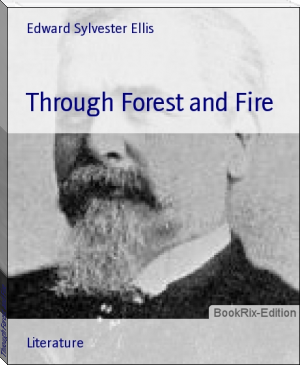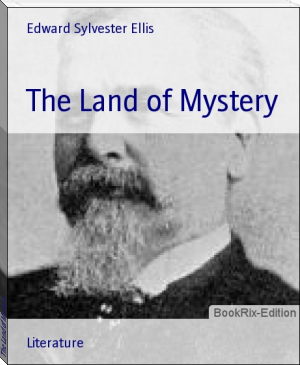The Land of Mystery by Edward Sylvester Ellis (book club reads .txt) 📗

- Author: Edward Sylvester Ellis
Book online «The Land of Mystery by Edward Sylvester Ellis (book club reads .txt) 📗». Author Edward Sylvester Ellis
But the immediate question which faced our friends was, whether it would do for them to reveal themselves to the Murhapas without again seeing their native friend. They deemed it probable that he had pushed on to the village, with the expectation of reaching it ahead of them and thus preparing the way for their reception.
This, however, was but a pretty theory which was as liable to be wrong as right. At any rate, Ziffak must reach his home ahead of or simultaneously with the whites. The latter continued using their paddles with steady vigor, until near noon, when they knew that considerably more than half the distance was passed.
They now began swaying their paddles less powerfully, for the feeling was strong upon them that they had approached as close as was prudent to the Murhapa village.
It was about this time, that they rounded a bend in the Xingu which gave them sight of the river for fully half a mile before another change in its course shut out all view. Naturally, they scanned the stream in quest of enemies, who were now likely to be quite close.
The first survey showed them a canoe coming down stream. It was near the middle and was approaching at a rapid rate.
Fred Ashman laid down his paddle and took up his binocular.
"It is Ziffak!" he exclaimed, passing the glass to Long.
"So it is and he is alone," was the reply of the astonished New Englander, who added an exclamation of surprise that he should be approaching from that direction. The only explanation was, that since last seeing him, he had made a journey to his home and was now returning to meet and convoy his friends to his own people.
Such proved to be the case, as he explained on joining them.
After the affair at the foot of the rapids, he paused long enough to make clear to the Aryks that not one of them was to make another offensive movement against the whites under penalty of the most fearful punishment. He explained that these particular white men were the friends of all natives, and that they never would have harmed an Aryk had they not been forced to do so to save their own lives.
The cunning Ziffak dropped a hint that the newcomers were much better persons than the couple that had made their homes among the Murhapas for so many years. Then, having completed his business in that line, he struck through the forest at a high rate of speed and soon reached his own people.
He expected to find Waggaman and Burkhardt there, but they had not yet arrived. He explained to his brother the king what had taken place at the rapids of the Xingu and succeeded in gaining his promise of the king that he would allow the white men to enter the village without the sacrifice of their lives; but he was not willing that they should remain more than a couple of days. Indeed he gave such assent grudgingly and probably would have refused it altogether, but for the earnest pleading of his beloved Ariel, who insisted that it would be a partial recompense of the crime of three years previous.
This was the best that Ziffak, with all his influence at court could do, and indeed it was as much as he expected to accomplish. He admitted that Waggaman and Burkhardt were likely to interfere, but he did not believe they could do so to any serious extent, provided the white men themselves were circumspect in their behavior.
While this interesting interchange was going on, the two boats were side by side, so gently impelled that their progress was moderate and conversation pleasant. Thinking that the Professor had slept long enough, and that he ought to know the news, Fred Ashman turned to wake him; but to his surprise, the German met his look with a smile and the remark that he had heard every word spoken. Then he rose to a sitting posture, saluted Ziffak and proceeded to light his pipe.
The latter pleased the whites still further by explaining that he meant to keep them company for the rest of the distance. Despite his encouraging statements, they felt much easier with him as their escort.
By using their paddles with moderate vigor, they could reach their destination by the middle of the afternoon. There was no better hour to arrive, for the king was always in his best mood after enjoying his siesta, which was always completed by the time the sun was half-way down the sky.
It was to be expected also that before that hour, Waggaman and Burkhardt would spread the news of the expected coming of the wonderful strangers. They would do what they could, to excite distrust and enmity, but Ziffak was positive that since his brother had given his promise, it would be sacredly kept, and that for two days at least their stay at the village would be without peril to any one of the little company.
CHAPTER XX. — AT THE MURHAPA VILLAGE.
The sun was half-way down the sky when the canoe containing the explorers, and accompanied by the smaller craft impelled by Ziffak, rounded a bend of the upper Xingu and came in sight of the village of the Murhapas.
The herculean native gave an extra sweep of his paddle which sent his boat slightly in advance of the other, and, striking the shore, he sprang out and turned about to wait for them to disembark.
The scene was an impressive one, which every member of the company was sure to remember the rest of his life.
The huts in which these strange people made their homes were similar in structure to those of the Aryks, but instead of being built around the three sides of a rectangle, composed one row, numbering more than a hundred, and facing the river. They stood a hundred yards from the water, and being at the top of the sloping bank were above the reach of the most violent freshet that ever came down from the mountain-fed sources of the mighty Xingu.
The ground in front of this novel town was cleared of all trees and undergrowth, but for most of the space was covered with bright green grass; the whole having the appearance of a well-kept lawn that had been artificially sodded or strewn with seed, which flourished with the luxuriance of every species of vegetation in that tropic country.
Not only in front, but on the sides and to the rear, for an extent of more than a hundred acres, the earth had been cleared with equal thoroughness and was growing abundant crops of cotton, tobacco, and edibles peculiar to the region.
The houses were separated by a space of several rods, so that the town itself extended a long way along the water. The dwellings, like those of the Aryks, consisted of a single story, with the door in the middle of the front, a window-like opening on each side of the same, roofed over





Comments (0)